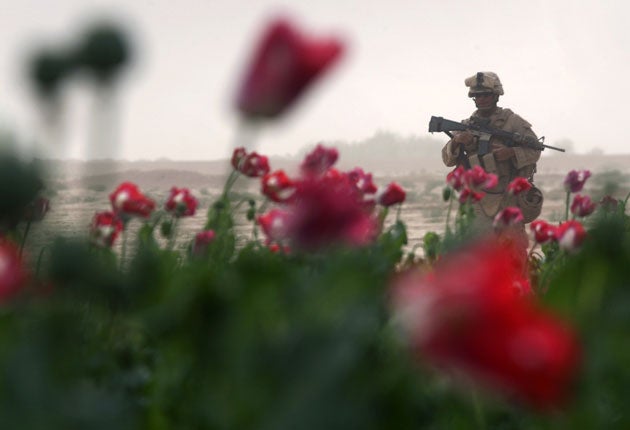
A two-month operation to clear poppy fields in Helmand province - the world's largest opium-producing region - has begun.
Afghan enforcement teams have a 60-day window between early March and late April, dictated by growing patterns, in which to take action to eradicate crops in the war-torn province of Afghanistan.
The aim is to eliminate harvesting of the illegal crop from at least 2,000 hectares in the food zone around the Helmand valley.
The drive is being led by the province's governor Gulab Mangal, aided by the work of Afghan security forces following years of fighting by coalition troops to secure swathes of land.
Major Ross Brown, head of eradication for the Provincial Reconstruction Team's (PRT) counter-narcotics department, said Afghan teams from each district would use tractors and ploughs, provided by international funding, to target farms ranging from small holdings to large, organised crime operations.
They will face constant danger as many poppy producers use improvised explosive devices (IEDs) - more commonly associated with the insurgency - to protect their crops.
Maj Brown said a carrot and stick approach was being used - almost literally.
Farmers who have been offered the opportunity and support to switch to growing carrots and wheat, but who have refused to take up the offer, will be targeted first.
Maj Brown said: "The long-term aim is to create a secure and stable food zone in the heart of Helmand.
"This would provide economic prosperity, strengthen the rule of law and ultimately provide a more sustainable future for Helmand.
"There is an increasing appetite among locals to eradicate poppy growth in the region.
"This is motivated by concerns about the large number of domestic drug addicts and the corruption associated with drug production.
"Most of all, locals are objecting because growing poppy is illegal and against Islamic law."
This year's operation is seen as crucial as next year will be the final opportunity to clamp down on poppy growth before the withdrawal of troops, he added.
Beyond next year, and without the support of coalition forces, the provincial government will have to decide whether to continue the eradication programme or hold the ground gained.
Poppy production in Helmand's food zone has been cut by 39%, 103,590 to 63,307 hectares, since 2010.
The trend since the arrival of coalition forces has not always been downwards. Poppy production accounted for 26,500 hectares in Helmand in 2005 and had risen sharply since the arrival of ground troops.
This has in part been attributed to a reaction to the end of the Taliban's brutal approach to law enforcement.
There is also an acceptance that it has taken time for the coalition to find a successful strategy but Maj Brown said the current approach appeared to be paying dividends.
However, according to PRT, while the food zone is being expanded, poppy growth within Helmand has spread outwards as producers squat on land outside the zone.
Poppy cultivation has also increased in other parts of Afghanistan.
PRT believes that establishing a secure food zone will eventually strengthen Helmand and reduce economic dependency on the drugs trade.
According to PRT, Afghanistan produces 90% of the world's opium with 48% originating from Helmand.
Opium production in Helmand is currently a billion pound industry which is said to contribute £150 million per year towards the insurgency.
Helmand has 100,000 heroin addicts and a total population of almost 1.5 million.
PA
Subscribe to Independent Premium to bookmark this article
Want to bookmark your favourite articles and stories to read or reference later? Start your Independent Premium subscription today.

Join our commenting forum
Join thought-provoking conversations, follow other Independent readers and see their replies